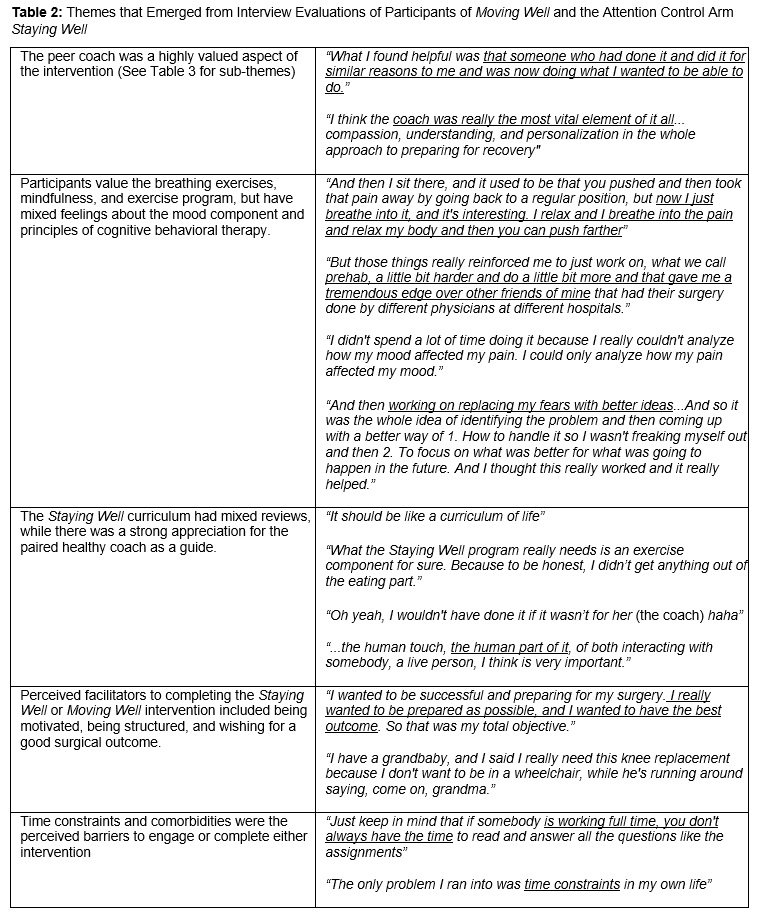Session Information
Session Type: Poster Session A
Session Time: 10:30AM-12:30PM
Background/Purpose: Moving Well was a pre-habilitation peer coach intervention aimed at reducing levels of anxiety, depression, and pain among individuals undergoing total knee replacement (TKR)1. A peer coach was a person who had knee osteoarthritis and TKR who was trained2 to guide another person in the preparation and recovery from TKR. The goal of this study was to evaluate the experience of the participants in both Moving Well and its attention control arm Staying Well to refine the interventions in preparation for a fully powered trial.
Methods: We conducted semi-structured interviews of participants in Moving Well and Staying Well. Interviews were offered regardless of completion of the intervention. The topic guide focused on barriers and facilitators to completing the intervention, the experience with the curriculum, logistics of the program, and the experience of working with a peer coach (Moving Well) or healthy coach (Staying Well). Data were analyzed thematically with two coders (CM and SRY) using NVivo software.
Results: Ninety-two participants completed the trial (52 in Moving Well and 40 in Staying Well). Eighteen participants completed the evaluation interviews (10 from Moving Well and 8 from Staying Well). Table 1 includes their demographic information. Five themes emerged (Table 2). These were: 1) The peer coach was a highly valued aspect of the intervention (Tables 2 and 3 with sub-themes); 2) Participants value the breathing exercises, mindfulness, and exercise program but have mixed feelings about the mood component and principles of cognitive behavioral therapy; 3) The Staying Well curriculum had mixed reviews, while there was strong appreciation for the paired healthy coach as a guide; 4) Perceived facilitators to completing the interventions included being motivated, being structured, and wishing for a good surgical outcome; 5)Time constraints and comorbidities were the perceived barriers to engage or complete either intervention. The Moving Well peer coach was influential for participants due to their shared experience and their ability to act as a motivator and allow for vulnerability. The curricular components combined with the peer coaches were tools to empower participants to exercise. While the Staying Well (control arm), was not intended to have an exercise program, the fact that individuals were eager to engage in exercising supports that the focus of Moving Well aligns with the needs of this population.
Conclusion: Peer coaching for preparation and rehabilitation from TKR was a highly valued aspect of Moving Well because of the role modeling, motivation, vulnerability, and shared experiences. The major barrier for completion was time constraints, which could be an area for improvement in the next iteration of Moving Well. References: 1. Jabri A, et al. A single-center, open-label, randomized, parallel-group trial to pilot the effectiveness of a peer coach behavioral intervention versus an active control in reducing anxiety and depression in patients scheduled for total knee replacement. BMC Musc Disord. 2023 PMID: 371475872. Paez YD, et al. Training of Peer Coaches to Assist Individuals with Knee Osteoarthritis Prepare and Recover From Total Knee Replacement. ACR Open Rheum. 2024 PMID: 39254264
To cite this abstract in AMA style:
Murphy C, Young S, Madrigal V, Hernandez N, Garcia D, Dominguez Paez Y, Safford M, Navarro-Millan I, Brown M. “No matter how great my doctor is, he hasn’t had a knee replacement, he doesn’t understand all that pain” Program Evaluation of the Moving Well Peer Coach Intervention for Total Knee Replacement [abstract]. Arthritis Rheumatol. 2025; 77 (suppl 9). https://acrabstracts.org/abstract/no-matter-how-great-my-doctor-is-he-hasnt-had-a-knee-replacement-he-doesnt-understand-all-that-pain-program-evaluation-of-the-moving-well-peer-coach-intervention-for-total-knee/. Accessed .« Back to ACR Convergence 2025
ACR Meeting Abstracts - https://acrabstracts.org/abstract/no-matter-how-great-my-doctor-is-he-hasnt-had-a-knee-replacement-he-doesnt-understand-all-that-pain-program-evaluation-of-the-moving-well-peer-coach-intervention-for-total-knee/


.jpg)
.jpg)